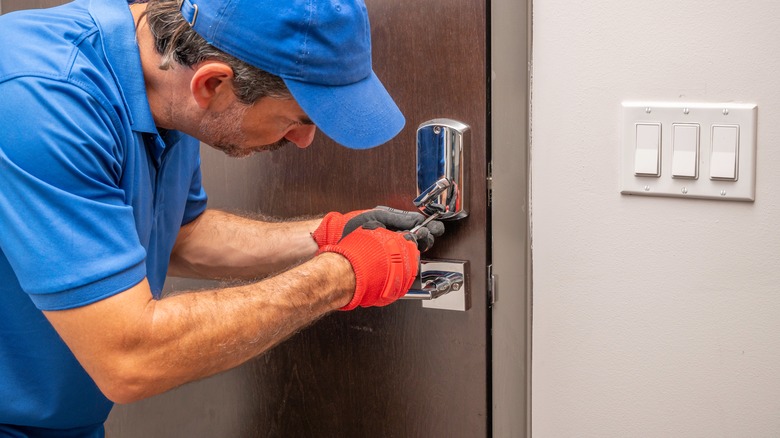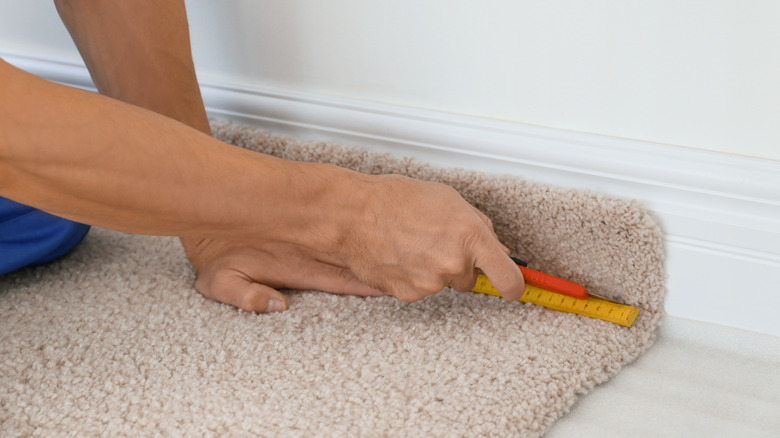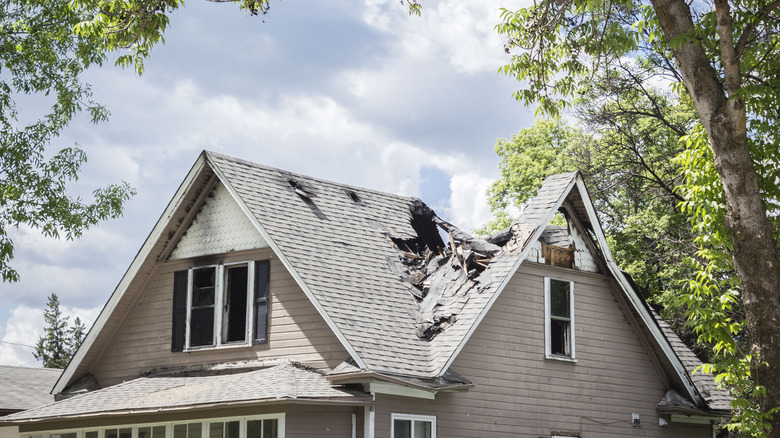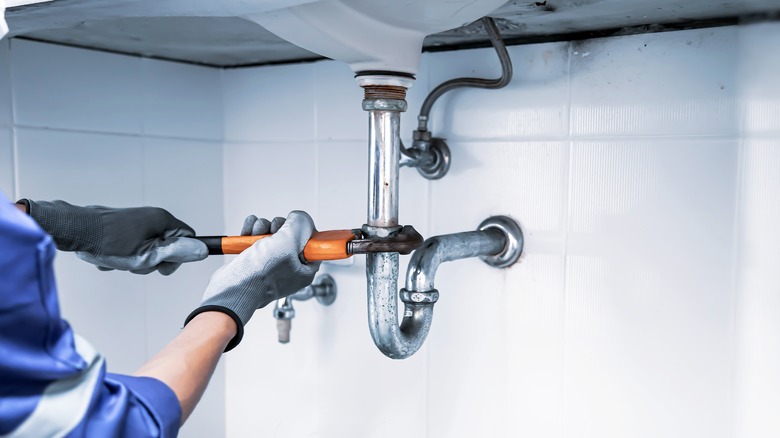How Long Should It Really Take For Your Landlord To Do Repairs When Renting?
Tenants are often concerned about timelines for all kinds of repairs and general maintenance on their properties. A tenant can pass on the responsibility to the landlord to repair and replace virtually the entire home project. For example, a renter won't have to install new carpeting, repaint walls, or repair damage from a leak unless they have contributed to an immense volume of damage in the property as a result of negligence or some other fault. It's this lack of responsibility that makes renting so appealing to younger people and many others, according to Moving.
It can be difficult to determine the timeline for waiting for different repairs throughout your tenancy. But a general classification system can help you identify whether your landlord is sticking to the rules or playing them a little fast and loose. The time your landlord should take to engage in any kind of repair depends on what sort of work that repair is. An emergency repair obviously demands a quick response time. In contrast, a major renovation project that will improve your quality of life but isn't strictly necessary might take considerably longer to complete. With these things in mind, it can be easier to identify how long you should expect to wait for any kind of service from your landlord.
Major repairs can take some time but an open dialogue can help
Major repairs like a window replacement, new carpeting, or new tile can take some time. Law Depot notes that a typical repair should be done within 30 days of receiving notice. Even though your landlord owes it to you to solve issues in the property in a timely manner, expensive updates and modernizations in the home will require the services of specialized professionals. Many landlords have developed relationships with general contractors and technicians who can be on hand with little notice to fix a leaky faucet or address other minor repair needs and problems in the home. However, painting the house, laying new flooring, or installing a new front door might be difficult to schedule with the appropriate professional.
Still, your landlord shouldn't make you wait for more than a reasonable amount of time for any kind of repair, even one that's expensive or time-consuming. It's also important to remember that certain modernization and upkeep items won't be addressed by your landlord just because you raised them. For instance, The Seattle Times reports that carpeting should be replaced roughly every ten years, so you shouldn't expect your landlord to replace the carpeting every year. However, if a problem has occurred in the flooring or some other element of the property, then your landlord will be required to solve it.
General repairs should be undertaken within a day or two of notice
Smaller scale issues like a problem with the plumbing, water heater, lock, stairs, appliance, or a pest concern will typically yield a solution within a week at most, according to Redfin. Often, timelines for these kinds of repairs are stipulated in your rental agreement. This gives you peace of mind knowing that routine maintenance needs throughout the property will be tackled quickly and effectively. Your landlord might not like jumping into action anytime you contact them regarding a minor problem in the house, but this is their responsibility and forms a key component of the investment opportunity that is owning rental properties. It's also a major asset in the column of the renter. Renters can live relatively carefree in their homes without addressing the financial implications of a broken dishwasher, creaky floorboard, or mice in the attic.
Even so, it's important to note here that your landlord is not a mind reader, and to get a problem solved; you'll need to alert them to the issue. As with any other problem you may encounter in your home, the best way to solve your problem in a timely fashion is to maintain a healthy relationship with your landlord.
Emergencies demand immediate attention
Another category of problem in the home falls under the guise of an emergency. Emergency issues will require an immediate response. For instance, if your home has a basement and a pipe burst, flooding this space, your landlord will need to jump into action as soon as you call them rather than waiting for a day or a month to begin looking for contractors or repair technicians.
An emergency can be an immense challenge both for landlords and tenants. Bay Management Group notes that emergencies are often classified as an immediate risk to health or safety, such as a break-in, fire, or a broken water line.
Landlords must understand that tenants don't want to see their properties damaged or destroyed, and a landlord certainly won't want their investment to lose value due to flooding, gas leak, or roofing failure. Both parties must work together in an emergency to solve the issue as quickly as possible. Your landlord is expected to act with immense haste when you alert them to an emergency repair requirement. Similarly, it's your responsibility as a renter to let your landlord know when this type of problem has occurred. If you allow a flood or substantial damage to the property to continue getting worse, then you may be responsible for part of the fix that will eventually take place.
You may need to repair something yourself for an immediate fix
The worst case scenario for a renter may be a landlord that doesn't take their needs seriously. A typical landlord will seek to maintain a healthy relationship with their tenant; however, not every landlord will act fairly or responsibly. If your landlord has ignored your request for a reasonable and necessary repair, it might be up to you to get the job done yourself.
If something breaks in your home that should be fixed by the landlord, such as a dishwasher or the lock on your front door, your landlord will need to work with you to solve the problem. But if this doesn't happen, you should consider alternatives to get the resolution you need and deserve. Live About reports that if your landlord has become derelict and their responsibilities to you, you might need to hire a technician or purchase the parts yourself to solve the problem. If this happens, you should keep all of your receipts related to the repair and ensure that you only communicate with your landlord through text or email to preserve evidence of the interaction.
Then when it comes time to pay your rent, deduct this amount from the funds you transfer to your landlord. This should always be a last resort for renters, but if it comes to this, ensure that you're clear in your intentions and keep detailed records.
A good landlord-tenant relationship is crucial for prompt resolutions
At the end of the day, the best way to get quick resolutions to any problem you might experience in your home is to maintain an open dialogue with your landlord and a positive relationship. There will always be a strange dynamic beneath the surface of a landlord-tenant relationship, but this doesn't have to mean that you can't see eye to eye and maintain cordiality and professionalism in your interactions. If you pay your rent on time every month and remain respectful of the property, your landlord will have no reason to be intransigent with you. Conversely, a landlord who wants to be paid on time shouldn't go out of their way to bring harm or irritation to their tenants. This relationship is a two-way street and requires work from both parties (via Forbes). Tenants who feel disrespected are less likely to care for their property or prioritize rent when times get tough.
None of this is to say that paying rent late or missing a payment entirely is a reason for a landlord to ignore a repair request. Also, if your landlord refuses to fix something that you think they should, it doesn't automatically give you the ability to withhold rent. Simply put, the best way for everyone to get what they want, need, and deserve is for landlords and tenants to be open and honest with one another.





